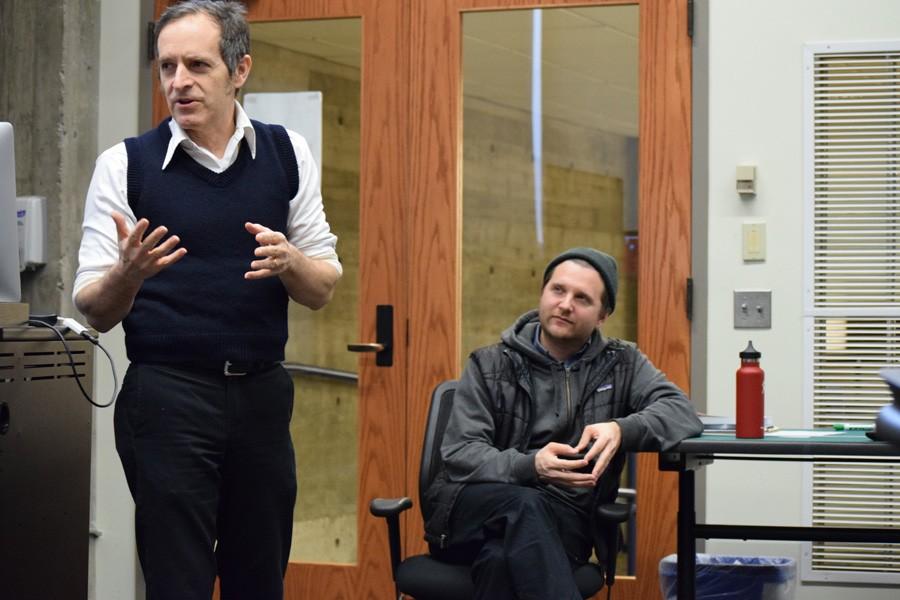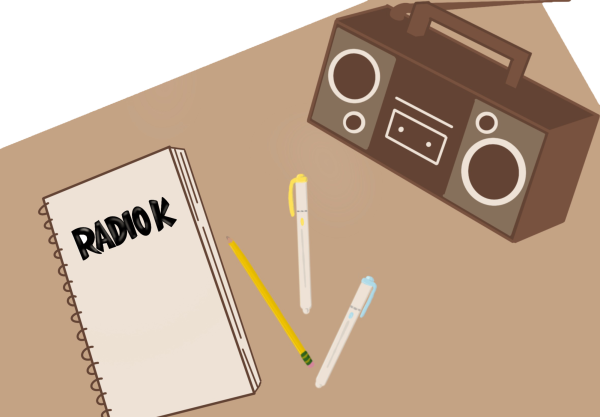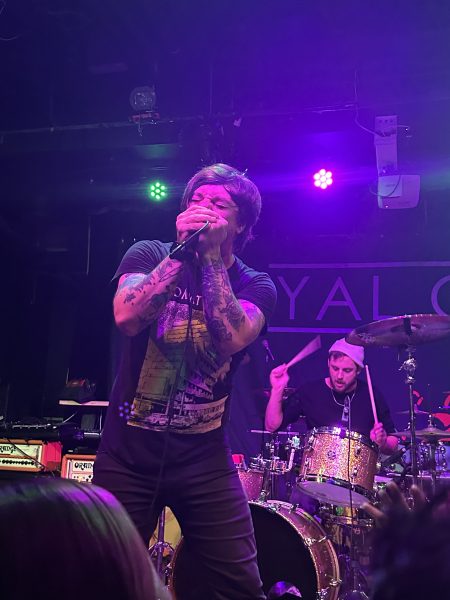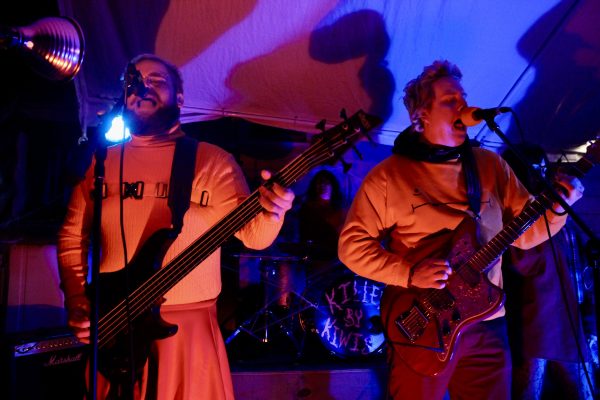DIY filmmaker connects with students
Writer, director and musician Cory McAbee visits campus on Friday, Feb. 5 to talk about his work and the importance of independent art.
Left, visiting filmmaker Cory McAbee speaks to a group of students and faculty in Bush Memorial Library on Friday, Feb. 5. Right, adjunct professor Richard Pelster-Wiebe watches and listens intently.
February 17, 2016
With a strong sense of do-it-yourself ethics and a desire to create, Cory McAbee has worked on everything from musical space westerns to feature length operas. He’s also started an international arts collaborative called “Captain Ahab’s Motorcycle Club” where anyone is allowed to contribute. All of these projects started with little to no money, and on Friday he emphasized that you don’t need a budget to create.
The precursor to many of these projects was “The American Astronaut,” McAbee’s first feature-length film about an interplanetary trader dealing in rare goods. He wrote, directed, starred in and made the music for this film, as well as his second feature-length film and musical space western, “Stingray Sam.” Since then he’s made a third feature-length film, illustrated a graphic novel and traveled the world attending various film festivals and cinema events.
During his Hamline visit, he talked to students not only about how most of these projects were created on a minimal budget but also how they were helped along by friends and critics.
“Making films and making music tends to be a collaborative process…You have to find people whose reflexes you trust,” he said.
McAbee believes that this collaborative process is important because it can help an artist see his art in a different light.
“Seeing [“The American Astronaut”] through the eyes of other people actually did change it,” he said, referring to how editors helped shape the final product of this film.
In between talking about the importance of collaboration, McAbee played clips from several of his films and even performed a piece from “Captain Ahab’s Motorcycle Club” in the classroom. He seemed to genuinely enjoy being around the Hamline artists and musicians in the room.
Afterwards, McAbee talked about how he got his work noticed, through taking initiative and doing everything himself.
“I had to get my own films out into the world. And I had to figure out my own way of doing it,” he said.
Richard Pelster-Wiebe, adjunct professor and one of the organizers of the event, was inspired by this “take action” attitude when he first saw “The American Astronaut” in 2001.
“I saw Cory’s work when I wanted to be a filmmaker, but had no idea how that would be possible… [I thought] You can’t do it without a million dollars,” he said.
Pelster-Wiebe used the creativity and do-it-yourself principles and tricks in “The American Astronaut” as inspiration to get his own work out into the world. Now a professor and filmmaker, he carries on this message to his students.
“The difference between you and Spielberg is that he’s making movies and you’re not,” he said, referring to advice that he gives his students.
McAbee also had an effect on several of the students in the audience. Creative Writing major Rebecca Drobinski (‘16) praised McAbee’s visit.
“I loved the event. I wasn’t expecting anything in particular, but he was very eloquent and you could tell that he cared deeply about what he was talking about,” she said.
Drobinski also appreciated McAbee’s energetic and alternative approach to creating.
“I feel like that approach would be beneficial toward most people. I find making things yourself really gratifying,” she said.
Other students in the room, many of whom were Digital Media Arts majors, filmmakers, musicians or writers, also seemed to be inspired by McAbee’s eloquence, approach and deep appreciation of the arts. The sentiment of “get out there and make something” seemed to echo throughout the room.
Outside of the classroom, McAbee’s influence has spread throughout the world. Emerging and established artists from Europe to Kalamazoo have contributed graphics, videos and music to his collaborative project. He hopes that everyone who is interested will join him in this project.
“Participation equals membership. You are all listening. Welcome to the club!” he said.
DIY principles have been a part of everything from cooking and building to music and filmmaking. They involve self-sufficiency and steering away from the influence of paid professionals. McAbee’s work embodies these principles, and he seemed to hope emerging artists everywhere grab a hold of them as well.
Of course, McAbee also acknowledged that there is one major drawback in creating this way: it’s tough to make any money. However, he seemed fine with this, content with creating for the sake of creating.
“I was born poor and that has never changed. And I’m very comfortable with that,” he said.
For more information about Cory McAbee, visit corymcabee.net, and for more information about his collaborative project, “Captain Ahab’s Motorcycle Club,” visit captainahabsmotorcycleclub.com.





